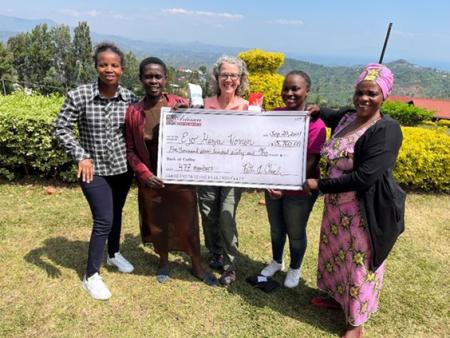A Sustainable Business-to-Business Approach to Importing Green Coffee from Women, Smallholder Producers in Rwanda
Introduction
This case study provides examples of some of the experiences and challenges of implementing a business-to-business (B2B) approach that intentionally incorporates sustainable economic development principles.
Image

In this study, we describe how FES supports women coffee producers through its programs and how Artisan, as a private sector actor in the coffee value chain, has managed the challenges of creating a sustainable supply relationship with women coffee co-operatives in Rwanda. Both companies address some of the broader challenges and opportunities associated with trading relationships and women’s economic empowerment. Some of the results of Artisan’s efforts are described, and recommendations for much-needed research validate the value of incorporating sustainable economic development principles in B2B relationships.
Artisan buys from about five Rwandan cooperatives, typically only buying from their women’s groups. This case study focuses on the B2B relationship between Artisan and Ejo Heza, the women’s group with a parent cooperative, Kopakama. We chose to write about the relationship with Ejo Heza because this is Artisan’s longest relationship, having started in 2016, and Kopakama is one the oldest coffee cooperatives in Rwanda. Before Artisan’s arrival, the female farmers named themselves “Ejo Heza,” which means “bright tomorrow” in the local Kinyarwanda language. Thus, the B2B relationship between Artisan and Ejo Heza has a unique focus on gender.
Organizations such as FES are strong supporters of change to benefit women in coffee by focusing on private-sector innovations that address gender-related challenges and supporting organizations like the International Women’s Coffee Alliance. They encourage the work by Artisan and others that focuses on the sustainability of supply chains over the long term. With this case study, FES seeks to highlight for readers how investments in women are a plausible means toward this end. FES would like to highlight the relevancy of investments in women to a country’s economic development and the importance of farm women and their families. This case study describes innovative programs Artisan has created and implemented that have supported a shift in mindset about cherry prices, fostered financial literacy and economic autonomy through a micro savings and loan program, and increased the number of women in leadership roles at Ejo Heza.
Gender Focus
The focus on women farmers in this study (and the work of FES and Artisan generally) is important because food insecurity in Rwanda is known to have a gendered component, with female-headed households more likely to be food insecure: 23% versus 17% for male-headed households. In a 2019 study by Chronic Poverty Advisory Network (Bird 2019), the area with the highest level of food insecurity in the country, 49%, was in the Rutsiro district, where Kopakama Co-operative is located. The World Bank estimates that 21% of Rwanda’s population lives below the international poverty line of US$1.90/day, 2011 PPP. This level of poverty is higher than that of Kenya (12%), Uganda (13%), and Tanzania (16%) (World Bank 2016).
The 2011 PPP, or “2011 purchasing power parity rate,” refers to a currency exchange rate created by the World Bank to compare values across countries and currencies. This means that a given sum of money will buy the same basket of goods in all countries when converted into US dollars at the PPP exchange rate (PPP dollars).

